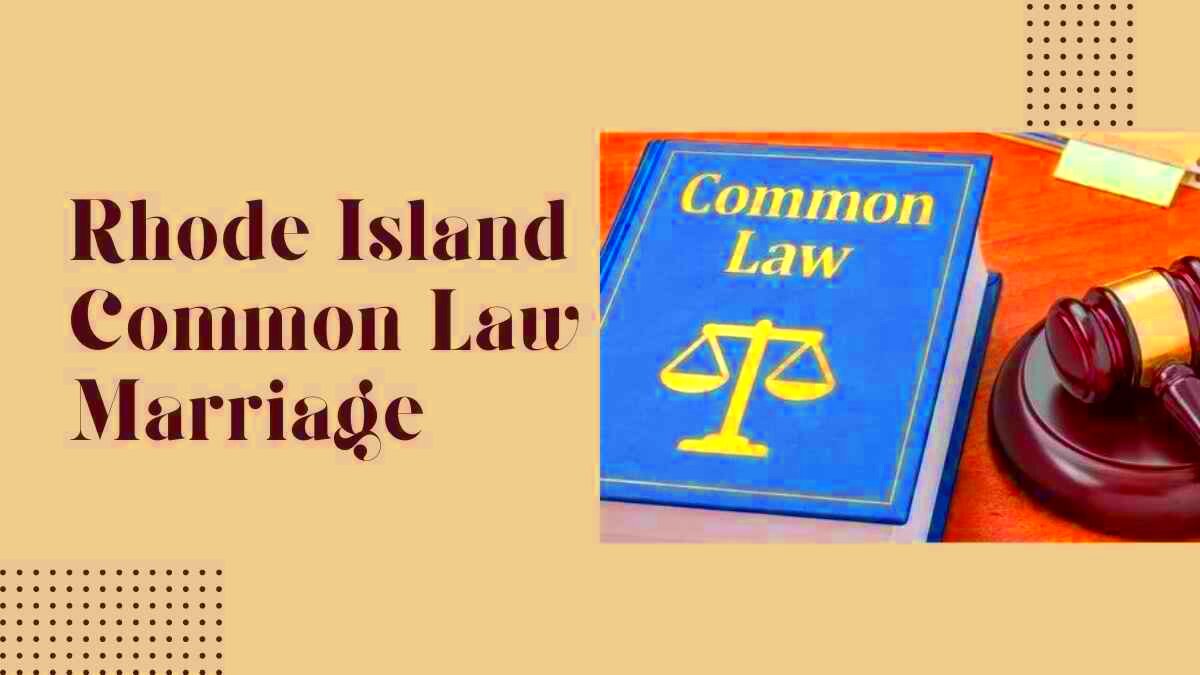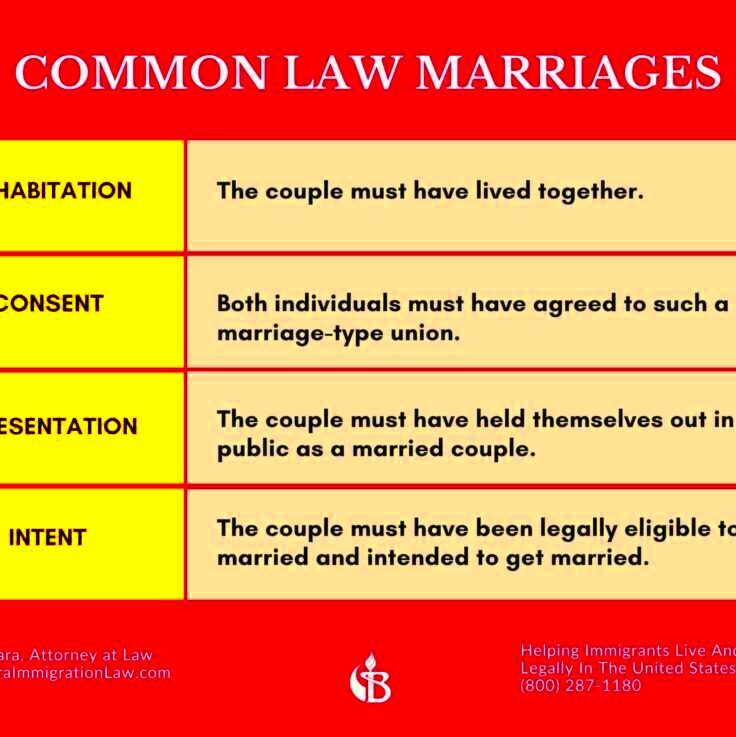Protection of Common Law Marriage in Rhode Island
Common law marriage is an idea that may appear somewhat puzzling if you’re not familiar with it. Unlike a conventional marriage that requires a ceremony and official documentation common law marriage relies on the behaviors and intentions of the couple. It’s a situation where two people cohabitate and portray themselves as being married without adhering to the formalities of a wedding. This type of marriage is acknowledged in certain states in the U.S. and it entails legal obligations and entitlements akin to those found in traditional marriages.
Picture a couple that has spent years together, weaving their lives building a cozy nest and standing by each other through life’s ups and downs. While they may not have tied the knot in a ceremony or inked a marriage certificate their devotion runs just as deep. Common law marriage validates that unwavering commitment providing legal safeguards that honor the unique bond they’ve cultivated over time.
Common Law Marriage in Rhode Island

Rhode Island is one of the states that still recognizes common law marriages, but there are specific requirements involved. Its crucial to familiarize yourself with the laws to ensure that a common law marriage is legally recognized. In Rhode Island for a common law marriage to be acknowledged the couple must fulfill certain criteria that demonstrate they share a genuine marital bond.
Unlike certain states Rhode Island does not automatically recognize common law marriages established outside its borders. This implies that if a couple relocates to Rhode Island from a state that acknowledges common law marriage they might have to present evidence of their relationship in court to have it legally recognized in the state.
Requirements for Common Law Marriage

To establish a marriage under common law in Rhode Island certain criteria must be fulfilled.
- Mutual Agreement: Both partners must agree to be considered married. This means that they should intend to be married and hold themselves out as a married couple to the public.
- Co-habitation: The couple must live together for a significant period. While Rhode Island does not specify an exact duration, a long-term cohabitation is essential.
- Public Perception: The couple must present themselves as married. This could be through joint tax returns, shared financial responsibilities, or introducing each other as spouses in social settings.
- Capacity: Both parties must be legally eligible to marry, meaning they are of legal age, not currently married to someone else, and have the mental capacity to enter into a marriage.
Meeting these criteria plays a role in validating the authenticity of a common law marriage making sure that the partnership is acknowledged for legal reasons like inheritance, property entitlements and spousal perks. If you happen to be in a common law marriage it’s advisable to keep records of your relationship and consult with a professional to safeguard your marriage, legally.
Legal Recognition and Protections

When it comes to marriage it’s important to grasp the legal recognition and safeguards involved. In Rhode Island once a common law marriage is formed and acknowledged it comes with numerous similar legal advantages and obligations as a conventional marriage. This encompasses rights concerning inheritance, property distribution and even spousal assistance.
Picture this, you and your partner have been cohabiting for quite some time, sharing everything from the mundane aspects of daily life to the weight of financial responsibilities. Then life throws a curveball in the form of a health scare or a legal predicament. If your common law marriage holds up in court you’ll gain the authority to make choices on behalf of your partner and access their benefits similar to what a legally married spouse would enjoy. This recognition safeguards the integrity of your relationship by upholding its commitment and providing legal protection.
Here are some important safeguards and advantages linked to a valid common law marriage.
- Inheritance Rights: If your partner passes away, you may have the right to inherit their estate, similar to a traditional spouse.
- Property Division: In the event of separation, the division of assets and debts will follow the same legal principles as for married couples.
- Health Care Decisions: You may be entitled to make medical decisions for your partner if they become incapacitated.
- Spousal Support: You might be eligible for spousal support if the relationship ends, similar to alimony in traditional marriages.
These safeguards can offer reassurance and consistency showing that your dedication is acknowledged by the legal system. It’s wise to seek advice from an expert to clarify your rights and responsibilities and to handle any potential challenges that may come up.
Challenges and Limitations
While common law marriage has its advantages it also presents challenges and restrictions. One of the obstacles is demonstrating that a common law marriage actually exists, particularly during legal disputes or when it comes to accessing benefits and entitlements.
Think about it if you and your significant other choose to relocate to a state that doesn’t acknowledge common law marriage you could encounter challenges in demonstrating the validity of your relationship. This could affect various aspects ranging from inheritance matters to medical choices.
Some common challenges include:
- Proof of Relationship: You may need to provide evidence of cohabitation, mutual agreement, and public presentation as a married couple, which can be complicated.
- State-Specific Laws: Each state has its own laws regarding common law marriage, and moving between states can create legal uncertainty.
- Limited Awareness: Not everyone is familiar with common law marriage, which can lead to misunderstandings or denial of rights in certain situations.
- Legal Disputes: In case of separation or legal issues, proving the nature of your relationship can become a contentious matter, often requiring legal intervention.
These obstacles emphasize the significance of keeping a record of your partnership and obtaining counsel to safeguard both you and your significant other and to be well equipped for any possible legal matters that may arise.
Differences from Traditional Marriage
Although common law marriage and traditional marriage may appear alike there are notable distinctions between them. Traditional marriage is marked by a ceremony, the completion of paperwork and widespread recognition across all states. In contrast common law marriage relies more on the couple’s behavior and intentions than on formalities.
Consider traditional marriage as a route with distinct signposts while common law marriage resembles an individual expedition where the end point is reached through shared dedication and living together. Here are a few key distinctions.
- Formalities: Traditional marriages require a wedding ceremony and legal documentation. Common law marriages do not involve formal ceremonies but are based on the couple’s intentions and behavior.
- Recognition: Traditional marriages are recognized in all states and countries. Common law marriage recognition can vary significantly by state, and not all states acknowledge it.
- Legal Processes: Traditional marriages are straightforward in terms of legal processes for divorce, inheritance, and benefits. Common law marriages can be more complex, requiring proof of the relationship and adherence to specific state laws.
- Social Perception: Traditional marriages often come with societal expectations and formal recognition. Common law marriages might lack the same level of social acknowledgment and can sometimes face misunderstandings.
Grasping these distinctions can assist you in navigating the legal and social facets of your relationship, making sure that both you and your partner are informed about your rights and duties. Its always prudent to seek advice from a professional to clear up any doubts and ensure that your relationship is appropriately acknowledged and safeguarded.
Legal Steps for Common Law Couples
When it comes to understanding the intricacies of common law marriage it’s crucial to be proactive. Unlike the simplicity of a traditional marriage the journey to common law marriage involves meticulous record keeping and strategic legal preparation to safeguard your rights. Whether you’re embarking on a new common law relationship or looking to solidify your standing these steps can assist you in establishing and protecting your union.
In my observations I’ve noticed the importance of being proactive for couples. A friend of mine encountered a challenge due to not taking any legal measures to formalize her common law marriage. To assist you in steering clear of such situations here’s a helpful guide:
- Document Your Relationship: Keep records of your cohabitation, joint financial accounts, and shared responsibilities. Documents like joint bank statements, leases, and insurance policies can serve as proof of your relationship.
- Seek Legal Advice: Consult with a family law attorney who can guide you on the specifics of common law marriage in your state and help you understand your rights and responsibilities.
- Create a Legal Agreement: Consider drafting a cohabitation agreement that outlines your mutual intentions and responsibilities. This can be particularly useful in case of disputes or legal challenges.
- Update Your Legal Documents: Make sure your wills, powers of attorney, and other legal documents reflect your common law spouse as a beneficiary or decision-maker.
- File for Recognition: In some cases, you may need to file a petition to have your common law marriage officially recognized. This can involve submitting evidence and possibly attending a court hearing.
Following these actions can help you safeguard the legal recognition of your relationship and be ready to face any potential legal issues that may come up.
Resources for Common Law Couples
When it comes to dealing with the intricacies of common law marriage having the right resources at your disposal can really make a difference. Whether you’re seeking guidance, emotional support or practical insights being able to tap into the resources can assist you in navigating and safeguarding your relationship effectively.
Throughout my personal experiences I have discovered that reaching out to sources can bring a great sense of comfort. For example my friend who was dealing with a common law marriage issue found support and direction through different organizations. Here are some helpful resources for common law couples.
- Legal Aid Organizations: Local legal aid organizations often provide free or low-cost legal services and advice for common law couples. They can help you understand your rights and navigate legal processes.
- Family Law Attorneys: Consulting with an attorney who specializes in family law can provide personalized advice and assistance tailored to your specific situation.
- Online Legal Resources: Websites such as Nolo or LegalZoom offer information and tools related to common law marriage and legal documentation.
- Support Groups: Joining support groups, either in-person or online, can offer emotional support and practical advice from others in similar situations.
- Government Websites: Check state government websites for information on the legal recognition of common law marriages and any necessary forms or procedures.
By using these tools you can gather information to guide your choices and receive assistance in managing your common law marriage smoothly.
FAQ
Q: How can I prove my common law marriage?
To establish a common law marriage you typically need to present proof of living together, a shared intention to get married and public recognition of your relationship. This can involve having joint bank accounts, co signing leases and getting statements from friends or family.
Q: What happens if we move to a state that does not recognize common law marriage?
If you relocate to a state that doesn’t recognize common law marriage you might encounter difficulties getting your relationship recognized. It’s important to seek advice from a lawyer to gain insight into how your rights could be impacted and what actions you can take to safeguard them.
Q: Can common law spouses receive spousal benefits?
In states that acknowledge common law marriage partners in a common law union typically have access to spousal benefits comparable to those granted to couples in a formal marriage. Nevertheless the availability of benefits may differ depending on state regulations and individual situations.
Q: How do we end a common law marriage?
Ending a common law marriage is usually a legal process that resembles getting a divorce. This could involve splitting up property, debts and possibly providing spousal support. Seeking advice from a family law lawyer can assist you in handling this procedure smoothly.
Q: Can a common law marriage be recognized if we didn’t officially register it?
In states that acknowledge common law marriage you don’t need to register. What’s important is having proof that your relationship fulfills the legal requirements for a common law marriage like living together and intending to be married.
Conclusion
Grasping and maneuvering through the intricacies of law marriage can be both challenging and fulfilling. The legal recognition and safeguards, along with the specific hurdles and disparities compared to conventional marriage, highlight the fact that law marriage occupies a position in the landscape of relationships. Personal anecdotes and shared experiences reveal that even though law marriage may not adhere to the route it still warrants thoughtful contemplation and readiness.
Whether you find yourself in a common law marriage or contemplating one it’s essential to be aware of your rights, obligations and the resources at your disposal. Taking steps seeking guidance and keeping meticulous records can bring you reassurance and safeguard the integrity of your relationship. Embrace this journey with the recognition that love and devotion form the core of any union whether it’s solidified through a wedding ceremony or woven through shared life experiences. Ultimately what holds significance is the connection you nurture and the way you navigate life’s path together.


